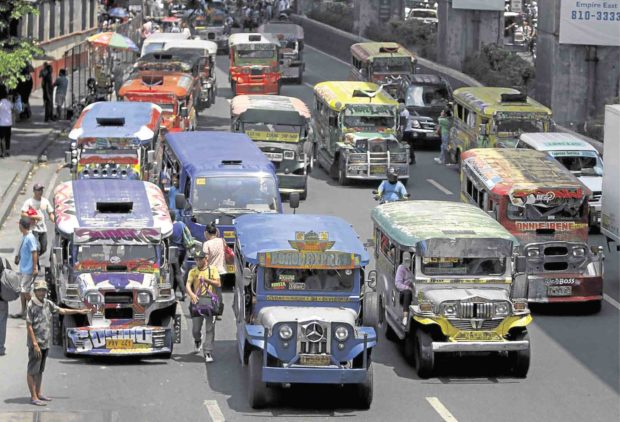
END OF THE ROAD? Jeepney drivers and operators are wary of the program but Malacañang says it is designed to help them and improve the public transport sector at the same time.—RICHARD REYES
The government’s jeepney modernization program will not drive jeepney drivers and operators out of business, but will instead strengthen the industry and address environmental concerns.
Malacañang made the assurance on Thursday as industry players complained that while the modernization would replace 270,000 smoke-belching jeepneys, it would also displace 650,000 drivers.
“We assure Filipino jeepney drivers that this initiative of the government to improve our public transport sector will not put them out of business,” said presidential spokesperson Harry Roque.
“It was not designed to phase out jeepneys,” Roque said. “In fact, the program aims to strengthen and guarantee the profitability of the jeepney business.”
The government plans to roll out the modernization plan, which President Duterte said would reduce air pollution, on Jan. 1.
Criticism of the plan spurred Mr. Duterte to rant against jeepney drivers and operators, threatening to arrest industry leaders who would stage another strike against the plan.
“If you can’t modernize that, leave. You’re poor? Son of a bitch, go ahead, suffer in poverty and hunger, I don’t care,” Mr. Duterte said after a jeepney strike in October.
Last Dec. 12, Mr. Duterte said the government would buy rubber bullets lawmen can use if the Pinagkaisang Samahan ng mga Tsuper at Opereytor Nationwide (Piston) pursues its threat to stage another transport strike.
Under the terms of public transportation franchises and the Public Service Act, or Commonwealth Act No. 146, public transportation franchisees are barred from staging strikes.
Jeepney drivers and operators oppose the modernization program because the cost of electric or hybrid vehicles, compliant with Euro-4 emission standards, is too prohibitive at P1.5 million to P1.8 million each.
But Roque said the Department of Transportation is already addressing their concerns with a government subsidy amounting to P80,000 per unit.
The Department of Finance, through the Development Bank of the Philippines and Landbank of the Philippines, is also offering loans offering a 5-percent equity, 6-percent interest rate, and a repayment period of seven years.
He also said the maintenance costs of the new e-jeeps would be very low or zero, which would translate to savings for the drivers and operators.